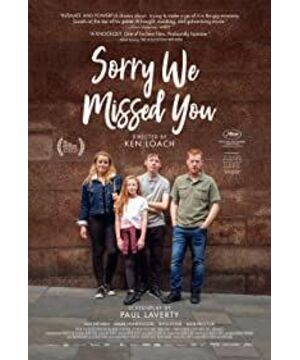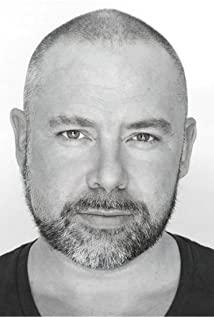Affected by the epidemic, most Chinese people have just passed the longest Spring Festival holiday in history. At the same time, some groups have been pushed to the "frontline" early. This is true for medical workers, and so are couriers. The difference is that we all see the work of the former; the hustle and bustle of the latter is often no one cares about. In fact, it is not easy for them to go through rain or shine. Next time, if you are delayed due to your own reasons, you might as well say to the courier brother——
Sorry we missed you
Sorry We Missed You
Director: Ken Rocky Screenplay: Paul Lafferty/ Ken Rocky Starring: Chris Hitchin/ Debbie Honeywood/ Rhys Stone/ Katie Proctor Release date: 2019-11 -01 (UK) Duration: 100 minutes
In May 2019, the gray-haired Ken Roach was once again invited to appear on the Cannes red carpet. The 80-year-old British director is a veritable veteran at the Cannes Film Festival. In the half-century of filming, he was shortlisted for 14 rounds in the main competition and won two golden palms. It is not once or twice that he has won the Jury Award, the Fabici Award, and the Catholic Humanitarian Award. The Venice Film Festival, the Berlin Film Festival, the Locarno Film Festival and the British Film Academy Awards also awarded him the honor of Lifetime Achievement Award. There is no doubt that he is the realist film master that cannot be ignored in contemporary Europe .
Ken Roach, who was born in a working family in England and graduated from the law department of Oxford University, has always been regarded as the conscience of British cinema . He has been defending the working class day by day for decades, always aiming the camera at the working people, unswervingly. Since the 21st century, the creative power of the old man is still strong, and the momentum is even stronger. The second Palme d'Or and the first BAFTA Best British Film Award in his career were won by "I Am Blake" three years ago.
Now that he is returning to Cannes with new works, he is already familiar with it. It is second to no prizes . It must be the original intention to hold the society accountable and help the lower-level voices . So I think this movie is valuable if it can be seen. The story takes place in Newcastle, a port city in the northeast of England. In the past, it was a resource-rich coal town; today, it is a thriving cultural center. Ricky from Manchester lives here with his wife and children, just like ants.
The 2008 financial crisis caused him to lose his job and his mortgage. The family had to rent a house outside, and life was extremely difficult. For ten years, Ricky has done all kinds of drudgery on the construction site. Only then made up his mind to sign a contract with a logistics company and became a franchise driver. According to his plan, after two years of work and a down payment, the family can move into a new house.
But everything has a price. For the Rich family, the cost of this job is too heavy to measure. On the one hand, in order to raise money to buy a minivan for her husband, his wife Abby , a carer, sold her private car. From then on, even if the client lived far away, she could only go there by bus, there was no other way. Not only has the commute time greatly increased, but arriving on time has also become a problem.
On the other hand, working hours of 14 hours a day, 6 days a week, deprived Ricky of the opportunity to get along with his family. The rebellious eldest son Seba began to play truant from school unscrupulously. The well-behaved and clever little daughter Lisa also suffered from insomnia at a young age because of the influence of her family environment. Ricky, the veteran driver with 25 years of driving experience, was caught off guard by the large and small unmanageable variables.
In the first half of the film, Ken Rocky's footage wanders a family of four with a calming rhythm, recording their respective life trajectories in detail. Here, Ricky is getting dizzy by the delivery address; there, the old man with dementia overturned the meal that Abby had prepared. Here, it is not uncommon for recipients who like to do nothing wrong; there, patients with frequent conditions also make Abby exhausted.
When they returned home at night, the two fell asleep so tired. On the contrary, the sensible young man always pays attention to his brother's movements and takes care of his parents' daily life. Homeless dad, broken-hearted mother, trouble-loving son, and understanding daughter. Ken Lodge accurately extracted a typical family sample from the vast crowd. This is how the embarrassment of the bottom of the society is, spread out inch by inch in the description of the details. It is true and original, and it can also commendably carry the overall situation and reflect the universality of the times.
Layers of pressure accumulate, and there will always be times when it can't be supported. At the moment when the good-tempered Abby lost his mind, the story ushered in a critical turning point. When she lost control of her emotions at the bustling station and shed tears, the drama prevailed for the first time and gradually replaced the sense of documentary. Her collapse was like a signal, warning of a series of tragedies that followed.
Sure enough, within two days, the school sent news that Seba had been suspended from school. But staying at home, he was uneasy, ran outside to steal things, and went into the police station again. Abby, who has always been able to arrange all the major and minor matters at home and outside the house properly, is already exhausted at this moment. Ricky had to go out in person to solve all the problems. In the process, the contradictions within the family were intensified to the extreme. The deep-rooted misunderstanding between father and son and the involuntary estrangement between husband and wife have also become more prominent.
But Ken Roach didn't mean to blame his father's arbitrariness or his son's rebellion. Because this is essentially a family that is forced to be alienated from each other . As the police officer said, Seba’s family cares about him and cares about him. Based on this alone, he is luckier than many unloved children.
Unfortunately, in a society dominated by money and efficiency, love is never omnipotent. As a result, the pressure from the outside made Ricky and Abby miserable, but also indirectly caused the internal division of the entire family. And this kind of institutional oppression is what Ken Rocky really wants to criticize. Abby was right. The reason Ricky lost his temper was because he was too tired in the final analysis.
With the high popularity of the Internet, the self-employed economy is rapidly challenging and challenging the traditional economic model. Ricky and Abby are so-called "self-employed people." They have relatively flexible working hours, can adjust the pace of their work independently, and to a certain extent get rid of the supervision of the leader. But correspondingly, they cannot enjoy employee benefits. The most deadly thing is that the risks are all on your own, and the labor law does not provide any protection for self-employed people.
As for temptations such as not counting performance and not having to check in, there is no such thing as Ricky and Abby. Doesn't this happen often in the film? As soon as Ricky asked for leave, the boss yelled at him for fear that he would not be able to meet the delivery target of the day. Or the elderly who can't take care of themselves ask Abby for help late at night, of course she can't bear to refuse.
"Self-employment" sounds nice, but for the diligent, honest and extremely lack of money, the Ricky couple is just another form of exploitation. In fact, they are still trapped in the chain of capital, working like a perpetual motion machine. What we see is the infinite convenience brought to mankind by high technology and big data. And Ken Rocky unearthed the essence of the capital operation behind it-they shift flowers and trees, take credit for pride, but make the working class complain and put themselves in purgatory.
However, what is even more sad is that Ken Rocky intervened deliberately but was unable to overthrow this dilemma. Hear how Ricky’s boss defended himself and the system. What he said was heartbreaking, but they were all facts. The fact is that no customer cares about the life and death of the courier. People value only price and efficiency, and everything that is vulgar but can be measured by numbers.
Capital has alienated everyone, and everyone is a slave to capital. It is indifferent and ruthless, and extremely harsh. Be obedient, and you can get the reward you deserve. But once you defy, you will undoubtedly "die". The annoying scanner kept beeping, but it held the lifeblood of the entire express station. In the eyes of capitalists, even if life is priceless, it is worthless compared to a £1,000 scanner.
Therefore, Abby dreamed of falling into the mud with her husband, and was puzzled: why the harder you work, the more you sink into the bottomless abyss and the deeper it is? Faced with the brutal exploitation of individuals by the system, Ken Rocky is powerless. But outside the system, there are families. Just like in Abby's dream, it was the child who rescued the parents in the quicksand with a branch. Under Ken Rocky's lens, a pair of sons and daughters gave them relief.
The sensible Lisa used to accompany her father to deliver goods on weekends, doing what she could do. The adults quarreled, and she was obviously too scared, but she still stood up to stop it. Even Seba, who was slapped, would silently express his concern after his father was injured. It was also this boy who was not doing business all day long. When his mother was going to take care of the elderly in a car alone, he suggested that his father drive a freight car with the whole family. They sang together, played together, did not complain, did not quarrel.
Such a beautiful memory, only this time, cannot be copied. The warmth of a moment can only be met unexpectedly, and the only thing that will never be absent is the drive of capital. Even with a swollen nose and blurred vision, at 6:30 in the morning, Ricky still had to start the engine on time to pay off his debts and to support his family, running all over the city. Regardless of whether it is stealing the key or picking up the car door, any form of retention is of no avail.
Innocent children always think that if they lose an annoying job, they can go back to the past. But the reality is not like this. The reality is that life will become more difficult if Dad has no job. They can't afford to go to school, can't afford to eat, can't afford to buy a house, maybe they will be ants for a lifetime.
Before leaving for the last time, Ricky left a card for his wife who had not yet woken up. The same card once appeared when Lisa helped him. Express delivery, if it catches up with the recipient’s absence, write a card and chat to apologize. Therefore, "Sorry, we missed you" is actually a polite notification from the courier to the customer. But this time, Ricky's "I'm sorry" was told to his family. He wanted to say, "I'm sorry, I went to work; I'm sorry to make you worry about me."
Between family and work, he must choose the latter. After all, family members are willing to wait for you, understand you, and support you, but customers, bosses, and scanners are impatient. When caring for the family makes him suffer too many punishments and warnings, love and tenderness are destined to become a footnote in life. Because he already understands that capital and money are the main things that determine the life and death of the whole family.
Ken Roach is often accused of being miserable and sensational. I think the person who said this probably never knew how widespread the suffering in the world is. Shouldn’t we be thankful that we can still see such a movie today? In this era when even images are used to whitewash the peace, few creators are qualified to speak sincerity. But Ken Lodge can, he can be trusted.
He let the aloof people break their opinions and get a glimpse of another life. He allows the "aphasia" at the bottom of the city to confide in their hearts and minds. Most importantly, he also told every audience who was heartbroken for the host-tears do not mean cowardice, thank you for your tenderness and compassion.
*Author of this article: kiwi
View more about Sorry We Missed You reviews










